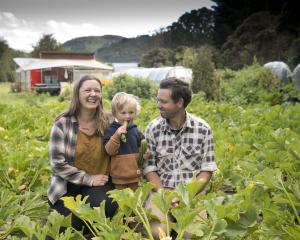
Co-owner Mike Darling said he often heard customers say how delighted they were when they saw the heritage fruit, including omega, black Doris and greengage plums, Moorpark apricots and the black boy and Wiggins peaches for sale.
The orchard also grew heritage tomatoes.
''People enjoy eating fruit of yesteryear,'' Mr Darling said.
Mulberries look like boysenberries but are smaller and quite sweet.
''They are sufficiently unusual, so we can ask a premium for them,'' Mr Darling said.
''They are pretty unique and no-one else sells them around here that I am aware of.''
The orchard has four mulberry trees growing in a net house. Three were already mature when the Darlings bought the 10ha property in 2012.
They planted the fourth a few years ago.
In a good year, one tree will supply 200 to 300 pottles of 200g.
He said the trees were not sprayed, but were given mulch and manure, and pruned.
''Insects don't seem to bother them but birds are an issue, which is why they are grown in the net house.''
A third-generation orchardist, Mr Darling is a former detective, and his wife, Dr Helen Darling, is a director of the Asia Pacific Food Integrity Centre, co-founder and chief executive of Sumfood Ltd, and is part of the Food Ingredients Expert Committee for the United States Pharmacopeial Convention (USP) and the Food Adulteration Expert Panel of the USP.
Son Hamish works on the orchard when he is not at the University of Otago studying law.

In addition to the mulberries and heritage fruit, the orchard grows six varieties of cherries, six varieties of apricots as well as nectarines and more modern peaches in a low or non-spray regime.
Produce is sold to local markets and supermarkets but the fruit is not exported.
A 5deg frost on October 13 badly affected the orchard, damaging 80% of the peaches and apricots.
''It has been a tough season,'' Mr Darling said.
''As we realised we had no apricots, we had to find some other crops this year so we are growing courgettes and ronde de nice, a variety of heritage zucchini.''
However, plums promised to be a good crop.
Despite the bad season, he was still enthusiastic about fruit growing.
''Orcharding is the best and worst job in the world.
''But there is something really honest about growing good fruit for money: It is a tangible thing and you can see what you did.
''It is never going to make us rich and we have got to be innovative, but it is unique.''














